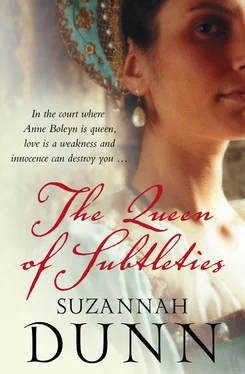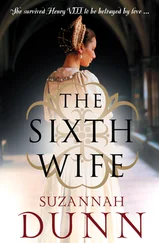‘Walk with me,’ he said.
I said nothing—biding my time—and simply did as he requested, moving ahead of him through the doorway into a courtyard. The air was warmer than I’d anticipated. All day long, I’d been stuck indoors, doing my lady-in-waiting duties: playing cards, playing music. Outside, my eyes seemed to open properly, wide, and I felt my shoulders drop. I wondered, briefly, why I didn’t do this more often: get away, walk away.
We went towards the rose garden. ‘Back home,’ he said, breaking the silence, ‘in our gardens, we can smell the sea. I miss it. I feel so hemmed in, here.’
‘Oh, so, we’re walking and talking, are we?’
That shut him up. Good. Walk with me, indeed.
I had a question for him: ‘What did you think of the play, last night?’
He looked about to offer up a platitude, but caught himself in time. His shrug was pitched somewhere between non-committal and despondent.
I said, ‘Yes, but you laughed all through it.’
He was defensive. ‘We’re at court.’ Court: eat, drink, and be merry. Then came that smile of his: ‘And, anyway, so were you; you were laughing.’
My turn to shrug. ‘We’re at court.’
‘You were probably laughing the most of anyone. You’re very good at it, aren’t you.’
‘At laughing?’
‘At being at court.’
I said, ‘I don’t do anything by halves.’
In the garden, we sat on a bench, and I said, ‘Do you want to know what I really think, Harry Percy, about that play? And all the plays, here? And the music, the poetry, the food, clothes, manners?’ I sat back, crossed my ankles. ‘The gardens, even?’
Elbows on thighs, he stared at the ground. ‘You miss France.’
I snatched a petal, rolled it between my fingertips. ‘Don’t get me started. I mean it. Tell me about where you miss. Tell me about that home of yours.’
So, we started with the places we’d come from, and ended, hours later, with the books that were changing our lives. I remember asking him how he’d got hold of one of them, still banned in England, and him replying that he had his sources. I said that was a secret I’d like him to let me in on, when he felt able.
He took the fragment of petal from me and said, ‘Oh, I don’t envisage keeping any secrets from you.’
Dusk had closed over us. The palace was emerging as a constellation of lit porches, lit windows. Passers-by, spellbound by the half-light, talked less guardedly than usual. Harry and I were adrift from the rest of the world, yet right at the heart of it. On dark water, but in the shallows.
‘Anne?’ He sounded almost weary. The kiss was the barest brush of his lips, very slowly, over mine. And mine over his.
From that moment onwards, all that mattered to us was being together. Whenever I saw him across a room being sweet and attentive to some woman, I’d smile to think how, a little later, he’d have his mouth jammed against mine and I’d have him helpless. I lived in a permanent state of offering silent thanks to God for Harry’s existence. I couldn’t believe my luck; I couldn’t believe how close I’d come, unknowingly, to a living death of never having known him.
But I’d reckoned without the man who, in England, at that time, played God: Cardinal Wolsey. Wolsey had other plans for Harry, for various political reasons. He had plans for Harry’s family which didn’t include a Boleyn. He contacted Harry’s father, who came and gave him hell before dragging him home and marrying him to a woman he didn’t know and grew to hate. And he’s still there: up there in Northumberland, rattling around his ancestral home, childless and drunk.
The worst that happened to me was that I was sent home to Hever for the summer; but, of course, at the time, it felt like a fate worse than death. I spent that summer railing against Wolsey. It wasn’t long before I was joined in that by the rest of my family, because that was the summer when my father was made a peer—Lord Rochford—and it looked as if all his hard work was paying off until Wolsey forced his resignation as Lord Treasurer. Some rubbish about a conflict of interests. We Boleyns lost a salary, and Wolsey gained considerably in our animosity.
My father hadn’t been alone, kneeling to be honoured in that crowded and unbearably hot Presence Chamber. In front of him was six-year-old Fitz, the king’s bastard son. Dimple-faced, apricot-haired Fitz, brought from his nursery in Durham House on the Strand. He was made Duke of Richmond, then he sat for the rest of the ceremony on the royal dais at his father’s right hand. Officially welcomed to court. A month later, he was sent away again, but only because of the sweating sickness that drove into London’s population. Suddenly he was the owner of a castle up north, and recipient of an income from eighty manor houses. Travelling up there with him was a staff of three hundred, including a retinue of the very best tutors. My point is that he left court not as he’d arrived—as Betsy Blount’s lovely little boy, the king’s adored bastard boy—but as a kind of prince.
Of course, something similar had to be seen to be done for the princess. Ludlow, for her, in August. I didn’t see Fitz’s departure but I was there in the courtyard for Mary’s; I remember the vivid livery of those two hundred servants: blue and green. I was one of the queen’s ladies-in-waiting. The queen was snivelling; she snivelled not only when the princess was taken away through the gates but for days afterwards. She was already becoming hard to please. Certainly the pomp of her daughter’s departure for Ludlow wasn’t enough to mollify her. She’d sat through little Fitz becoming a knight of the garter in April, but his peerage in June and the northern palace in July was, in her view, going too far. Wolsey dismissed three of her women for moaning about Fitz’s fortunes, and, worse, when she appealed, he refused to reinstate them. He had his uses, he had his moments. This was quite a shot across Catherine’s bows. And at a bad time, for her, too: the previously talked-of Spanish betrothal for her under-sized brat having been scuppered. My point is that quite suddenly, that summer, no one of any standing was taking Catherine seriously, nor did they look set to.
The story that everyone tells is that Henry divorced his long-suffering, sweet-natured, middle-aged queen for me, a younger woman, a dark-eyed, gold-digging, devil-may-care temptress. The truth is more complicated. Take my age. I was twenty-six when Henry fell for me. No girl, then. At that age, I really should have been married (and would have been—I’d have been Countess of Northumberland—but for Wolsey). I should have had children. At twenty-six, I was worldly, educated, ambitious. No wide-eyed plaything. Yes, I was younger than Catherine—but who wasn’t? She was forty, and seemed half as old again. It was all over, for her: the supposed bearer of heirs, she hadn’t been pregnant for a decade. She was a dead weight on Henry.
And what a weight! What she lacked in stature, she made up for in girth. With all the health problems that you’d expect. And no wonder: all those failed pregnancies. And no wonder they failed, with everything that she put herself through: the ritual fasting, the rising during the small hours to pray, the arduous pilgrimages, trekking in all weathers, for weeks on end, to Walsingham. All this took a toll on her spirits, too. She retreated among her pious Spanish ladies and their Spanish priests. Ceased to live in the real world. But, then, in many ways, she never had. I’ll not deny what people say, that she always had a kind word for everyone. The problem was in understanding it. Despite all her years in England, she was hopelessly foreign.
Why had Henry ever married her? Let’s not forget it was his choice. His father had died. Only just died, in fact, and there’s the answer: the marriage was Henry’s choice, his first; the first big decision of a new, seventeen-year-old king. Marrying Catherine, he all at once made his mark and a prudent political move, an alliance with Spain. And, anyway, Henry was a chivalrous man; big-hearted, and determined to do the right thing. He wanted to end Catherine’s misery: this kind, stoical, scholarly young woman, as he saw her, who was stuck in England, widowed, orphaned, and impoverished.
Читать дальше












